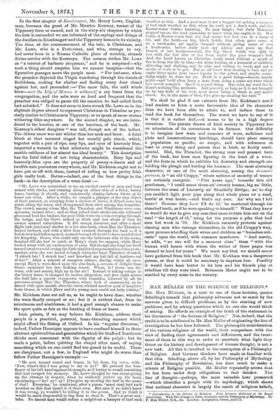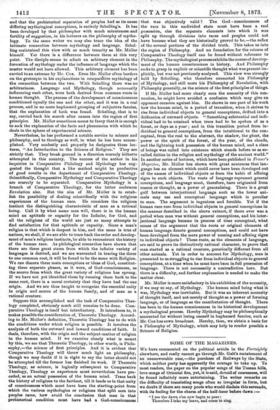MAX MULLER ON THE SCIENCE OF RELIGION.* Mn. Max MULLER,
in a note to one of these lectures, quotes Schelling's remark that philosophy advances not so much by the answers given to difficult problems, as by the starting of new problems, and by asking questions which no one else would think of asking. He affords an example of the truth of the statement in his discussion of "the Science of Religion." Not, indeed, that the credit is to be attributed to Mr. Max Muller of originating the line of investigation he has here followed. The philosophic consideration of the various religions of the world, their comparison with the view of finding their agreements and differences, and the treat- ment of them in this way in order to ascertain what light they throw on the history and development of human thought, is not a new task. All this is involved in the conception of a Philosophy of Religion. And German thinkers have made us familiar with that idea. Schelling, above all, by his Philosophy of Mythology and his Philosophy of Revelation, has done much to make a, science of Religion possible. Mr. Muller repeatedly avows that he has been under deep obligations to that thinker. The line of thought—perhaps, the most valuable here presented —which identifies a people with its mythology, which shows that national character is largely the result of religious beliefs,
Introduction to the Saes' tee of Religion. Four Lectures delivered at the Royal Institution. With Two Essays on False Analogies and Me IMMotophy of Mythoiogy. By F. Max Miller, MA., &c. London: Longmans, Green, and Co,
and that the prehistorical separation of peoples had as its cause differing mythological conceptions, is entirely Sobelling's. It has been developed by that philosopher with much minuteness and fertility of suggestion, in his lectures on the philosophy of mytho- logy. To the same writer we may also trace the idea of the intimate connection between mythology and language. Schel- ling maintained this view with as much tenacity as Mr. Muller himself. Yet there is a difference between them at this very point. The disciple seems to admit an arbitrary element in the formation of mythology under the influence of language which the master would not have allowed. This arbitrary element has been carried to an extreme by Mr. Cox. Even Mr. Muller of ten borders on the grotesque in his explanations in compariZtive mythology of the connection between the two. With Schelling there was no arbitrariness. Language and Mythology, though necessarily influencing each other, were both derived from common roots in human thought. The process of the development of consciousness conditioned equally the one and the other, and it was in a real process, and in no mere haphazard grouping of subjective fancies, that the explanation of both was found. Schelling, that is to say, carried back his search after causes into the region of first principles. Mr. Miller sometimes seems to fancy that it is enough to seek the explanation of the facts and phenomena with which he deals in the sphere of experimental science.
Nevertheless, he has performed a notable service to science and philosophy, and to theology as well, in what he has here accom- plished. Very modestly and properly he designates these lec- tures, "An Introduction to the Science of Religion." They are strictly that. They break ground in a direction scarcely hitherto attempted in this country. The Success of the author in his inquiries in Comparative Philology and Mythology has sug- gested the thought that a like method might be productive -of good results in the department of Comparative Theology. Scientifically, Comparative Mythology and Comparative Theology are scarcely to be separated. Comparative Mythology is a branch of Comparative Theology, for the latter embraces Revelation also. But the aim of Mr. Miiller is to estab- lish the possibility of dealing scientifically with the religious experiences of the human race. He considers the religious instinct the distinguishing characteristic of man as a rational being. Call it by what name men will, there is in the human mind an aptitude or capacity for the Infinite, for God, and -all the religions of the world are just so many attempts to find satisfaction for that aptitude or capacity. Since a man's religion is that which is deepest in him, and the same is true of nations, we shall, if we are able to trace back the order and develop- ment of man's religious instincts, be able to reconstruct the history of the human race. As philological researches have shown that there are three great stems from which the infinite variety of languages is derived, and we are warranted in tracing the three to one common root, it will be found to be the same with Religion. We can discern three main conceptions or ideas of God, constitut- ing three separate phases, as it were, of God-consciousness, as the source from which the great variety of religions has sprung. If we have not yet identified these by running them back to the same root, there is a moral certainty that they have had the one origin. And we are thus taught to recognise the essential unity in origin and source of the human family, and of man as a -rational creature.
Suppose this accomplished and the task of Comparative Theo- logy completed, obviously much still remains to be done. Com- parative Theology is itself but introductory. It introduces to, it makes possible the consideration of, Theoretic Theology. Accord- ing to Mr. Mtiller's definition, Theoretic Theology has to do with the conditions under which religion is possible. It involves the analysis of both the outward and inward conditions of faith. It -deals, therefore, with the origin and the subject-matter of religion in the human mind. If we examine closely what is meant by this, we see that Theoretic Theology, in other words, is Philo- sophy,—the science of first principles. And it is evident that Comparative Theology will throw much light on philosophy, though we may doubt if it is right to say the latter should not be attempted till the former has finished its work. If Theoretic Theology, as science, is logically subsequent to Comparative Theology, Theology as experience must nevertheless have pre- ceded, as an actual possession of the human mind. Trace back the history of religions to the farthest, till it lands us in that unity of consciousness which must have been the starting-point from which the various mythologies or religions that split men into peoples came, how avoid the conclusion that man in that prehistorical condition must have had a God-consciousness that was objectively valid ? The God - consciousness of the race in this undivided state must have been a real possession, else the separate elements into which it was split up through divisions into races and peoples could not have become what they are historically proved to be,—the reflex of the several portions of the divided truth. This takes us into the region of Philosophy. And no foundation for the science of Comparative Theology itself can be found without reference to Philosophy. The mythological process exhibits the course of develop- ment of the human consciousness in history. And Philosophy seeks to grasp in explicit or scientific thought what was present im- plicitly, but was not previously analysed. This view was strongly held by Schelling, who therefore connected his Philosophy of Mythology, and still more his Philosophy of Revelation, with Philosophy generally, as the science of the first principles of things.
If Mr. Muller had more clearly seen the necessity of this con- nection, he might have avoided a confusion which may give an opponent occasion against him. He shows in one part of his work how the human mind, in a period of transition, when it strives to rise from individual objects to general conceptions, drifted into a deification of outward objects. "Something substantial and indi- vidual had to be retained when trees had to be spoken of as a forest, or days as a year ; and in this transition period from in- dividual to general conceptions, from the intuitional to the con- ceptual, from the real to the abstract, the shadow, the ghost, the power or the spirit of the forest, of the year, of the clouds, and the lightning took possession of the human mind, and a class of beings was called into existence which stands before us as so- called deities in the religion and mythology of the ancient world." In another series of lectures, which have been published in Fraser's Magazine, Mr. Muller has shown with great acuteness that lan- guage has an element which could never have been developed out of the names of individual objects or from the habit of affixing signs to such objects. The roots of language represent general conceptions, and language must, therefore, have originated from reason or thought, as a power of generalising. There is a great gulf between interjectional language such as the lower ani- mals may use and conceptual language which is peculiar to man. The argument is ingenious and forcible. Yet if the human race rose from individual objects to general conceptions in the manner described in the above extract, if there ever was a period when man was without general conceptions, and his inter- jectional language became in process of time conceptual, what comes of the argument that the roots or original elements of human language denote general conceptions, and could not have been developed from the mere power of naming and affixing signs to individual objects ? These roots, as the elements of language, are said to prove its distinctively rational character, to prove that man started as a rational creature, generically different from all other animals. Yet in order to account for Mythology, man is presented to us struggling to rise from individual objects to general conceptions, at a time when he must have been in full possession of language. There is not necessarily a contradiction here. But there is a difficulty, and further explanation is needed to make the matter clear.
Mr. Miller is more satisfactory in his exhibition of the necessity, if we may so say, of Mythology. The human mind being what it was, Mythology was inevitable. But it was an inherent necessity of thought itself, and not merely of thought as a power of forming language, or of language as the manifestation of thought. There has been in the human consciousness in its historical development a mythological process. Hereby Mythology may be philosophically accounted for without losing oneself in haphazard fancies, such as Mr. Cox has sown broadcast. Hereby, then, we obtain a basis for a Philosophy of Mythology, which may help to render possible a Science of Religion.



































 Previous page
Previous page